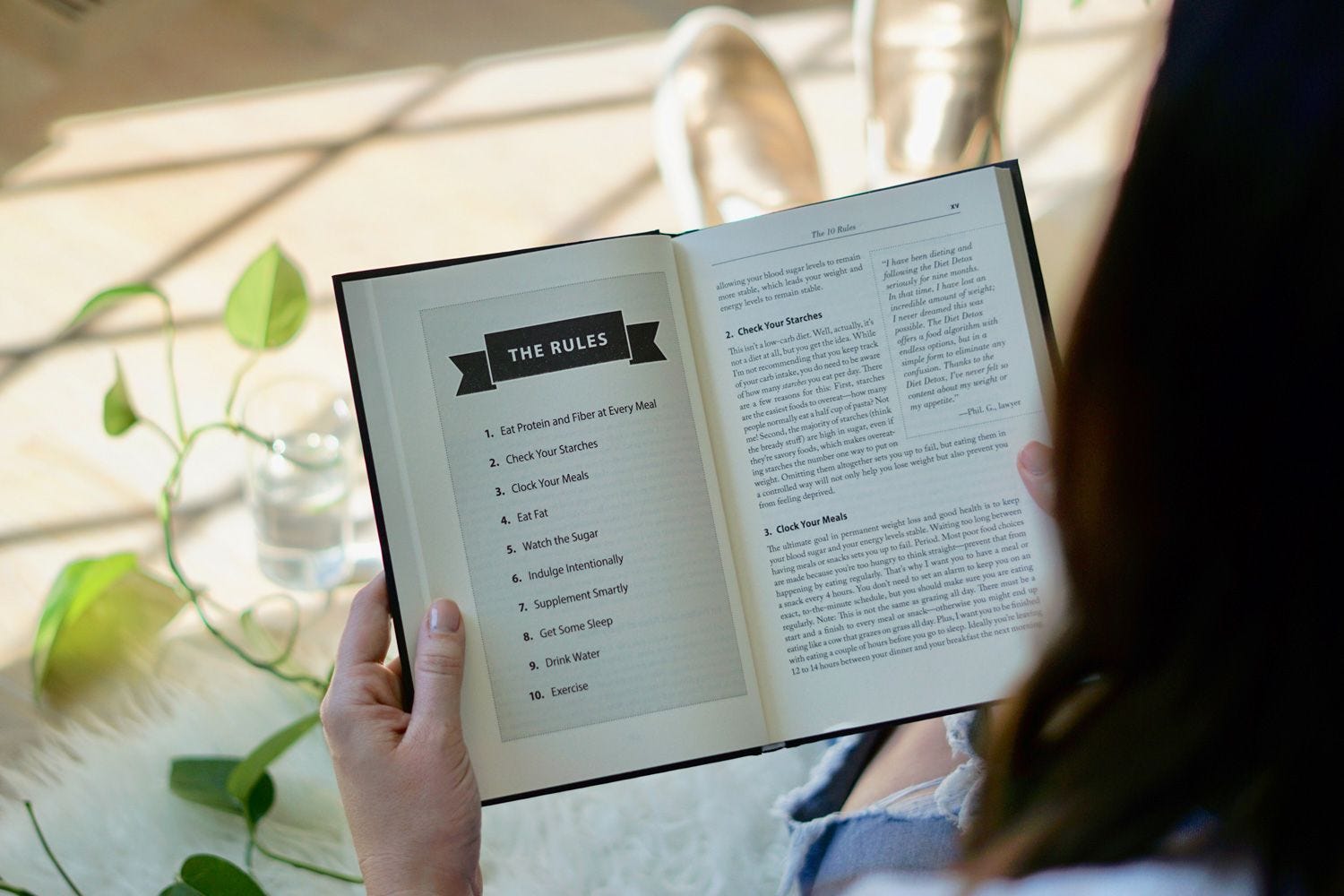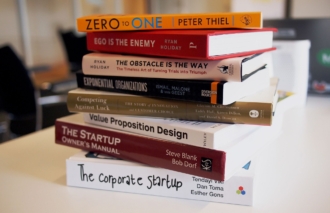I like socks.
They are soft.
They are practical.
And their playful designs give my startup attire a much-needed lift of color.
Put simply, I have never regretted time spent searching for the perfect pair of socks.
Unfortunately, I can’t say the same for the hours I spent reading self-help books that didn’t always deliver.
The pattern went something like this:
Hear the hype, buy the self-help book, and read a few chapters, before realizing it was nothing more than an old technique in a new wrapper. And yes, the book was nearly 400 pages when it could have been 15.
Hardly a week goes by without an article trending on how to become the next Elon Musk, Bill Gates or Warren Buffet.
Clearly, I’m not the only one interested in self-improvement. However, I’ve recently come to a possibly unpopular conclusion:
I would be better off learning how to knit socks than reading most professional development materials.
Not only would my feet be comfy, but I might also turn a profit. Fun fact: Socks is a $2.8 billion industry.
Today there is no shortage of self-proclaimed experts claiming to have unlocked the formula for extreme success in all areas of life.
According to Marketresearch.com, the U.S. self-improvement industry is predicted to be worth $13.2 billion by 2022.
I don’t doubt that many of the individuals publishing this information have good intentions, nor those useful insights can sometimes be obtained from reading it.
Yet, I often find myself wondering:
How did they arrive at their conclusions? And what makes them qualified to tell me how to be the best version of myself?
The self-help industry runs on several well-established assumptions, including: If it worked for them, it will work for me.
Which is why a week doesn’t pass without a new article trending on how to copy the reading habits, morning routines and bedtime practices of uber-successful people.
Obviously, we are fascinated by individuals who are exceptionally good at what they do. Their personal stories provide useful reminders that mastery doesn’t happen overnight.
For example, Kobe Bryant was notorious for holding ridiculously focused practice sessions. The 5-time NBA championship winner sometimes wouldn’t leave the court until making 800 jumpshots.
It’s stories like these that make us want to fulfill our potential as human beings and push the boundaries of what we think is possible.
While self-help authors are obsessed with selling common characteristics that made those icons so successful, they seem to ignore one common element that can’t necessarily be taught.
It’s what makes the 6 a.m. practices, the grueling workouts and the day-in-day-out discipline possible.
It isn’t something you can get from drinking kale smoothies, doing power yoga or utilizing the Pomodoro Technique.
It’s obsession. It’s dedication. It’s patience. It’s perseverance.
Every icon who has gifted the world with an unprecedented invention, contribution or craft seems to be driven by a tenacious desire to make something.
Ironically, these individuals didn’t necessarily read self-help books. Their motivation seemed to be mostly internal.
For example, no one told Mozart to play the piano everyday. He did just did it.
Picasso. DaVinci. Disney…Same thing.
Today’s most exceptional innovators, entrepreneurs, and trailblazers appear to be no different.
Case in point: TED curator Chris Anderson asked Elon Musk how he was able to innovate in such a remarkable way.
Here’s what Musk said:
1. He works a lot.
So does my accountant, my attorney, and my housekeeper.
2. He studies the physics of things.
This makes sense; it relates to what Musk wants to build.
3. He pays attention to constructive feedback.
Every leader should make a conscious effort to do this.
The point?
Most of us could copy Musk’s “recipe for success,” yet never produce anything remotely comparable to Tesla. Why?
We aren’t all internally motivated to read books on physics for 10 hours a day.
And we don’t share the same combination of past experiences, natural traits, and values that inform Musk’s mindset.
The real reason why self-help fails
We are told we can achieve the same results as someone else by copying their actions. Yet none of the tips, tricks, and hacks we acquire are ever enough.
Self-help pundits fail to emphasize an important fact: The practice, habit or method being promoted was originally developed by someone else to achieve their goals. In other words, someone transforms a practice — that was only ever meant for the originator — into “a technique.”
Sometimes those techniques appear to work for us, and other times we’re better off knitting socks.
The person we admire figured out what worked best for them and achieved extraordinary success because they were not focused on what others were doing.
Self-help vs. our (mental) health
According to a recent study conducted by The University of Montreal, consumers of self-help books are more sensitive to stress and show more depressive symptoms than those who don’t read such literature.
Obviously, this presents a “chicken or egg” problem: Do high-stress levels lead people to read self-help or does reading self-help make people even more stressed out?
Catherine Raymond, a PhD student and the study’s lead author, says both theories are possible. However, further studies would need to be conducted to confirm the direction of the association.
Regardless, the study found zero correlation between reading self-help and maintaining desirable qualities like emotional stability, self-esteem and self-discipline.
Many individuals feel worse after not getting results from techniques that were never right for them in the first place. The worst part? They blame themselves.
At one point or another, these people have been my friends, my family members and even myself. Rarely, do we stop and think:
Maybe the problem isn’t me — maybe it’s assuming someone who knows nothing about me knows what’s right for me.
Should we throw out self-help entirely?
Should we never buy another productivity book?
Should we avoid clicking on the next “How to make a sandwich like Elon Musk” article?
While I don’t think either of those actions is necessary, I do think it’s important we ask ourselves why we want to read something.
Learning how others do things can be both entertaining and useful. But it should never be a substitute for getting to know ourselves and forging our own paths.
As cheesy as it sounds, the best way to achieve extreme success in this world might still be to be yourself.
And that means
a) Knowing who you are
and
b) Not pursuing something for the sake of wanting to be great.
I’m not qualified to hand out information on how to “know thyself,” but I will say this — we’re unlikely to find the answer to that question in a book.
It’s in the little things.
The things that brought us joy as a kid.
The unique ways we enjoy using our mind.
Take me as an example. Call it the obsession, dedication, internal force, or perseverance. It is how I was able to wake up early every morning before heading to my full-time job to work on Jotform on the side.
I was obsessed with programming the world’s most user-friendly form-builder, and I somehow believed I was capable of turning it into a business.
Shortcuts to success by copying my icons? Well, the road to building Jotform took 12 years of experimentation, failure, and learning to develop the habits that worked best for me. And I’m still trying my hardest.
For example, when I first started Jotform, I was often advised to seek venture capital. In fact, the majority of tech startups around me were running on the Silicon Valley mantra “Fail fast, fail often.”
But I knew I was risk-averse. And I knew that I liked spending quality time with my family and meeting up with friends. Working 80-hour weeks to achieve rapid growth wasn’t right for me.
Had I followed the actions of many of my personal entrepreneurial heroes, and taken VC, I may have pushed the startup into scaling before I was ready.
Instead of trying to copy our icons, why don’t we let them inspire us to discover our own unique ways of doing things?
Forging my own path has enabled me to grow Jotform to 4 million users without a single dime in outside funding. And I hope it can enable you to build your own thing, too.
We don’t have to wake up 6 am to become successful just because a productivity guru told us to do so.
We don’t have to read 100 books a year.
We can instead try working toward a vision that genuinely interests us and doing it on their own terms.
What do you think?














Send Comment:
1 Comment:
More than a year ago
Very insightful. Well said